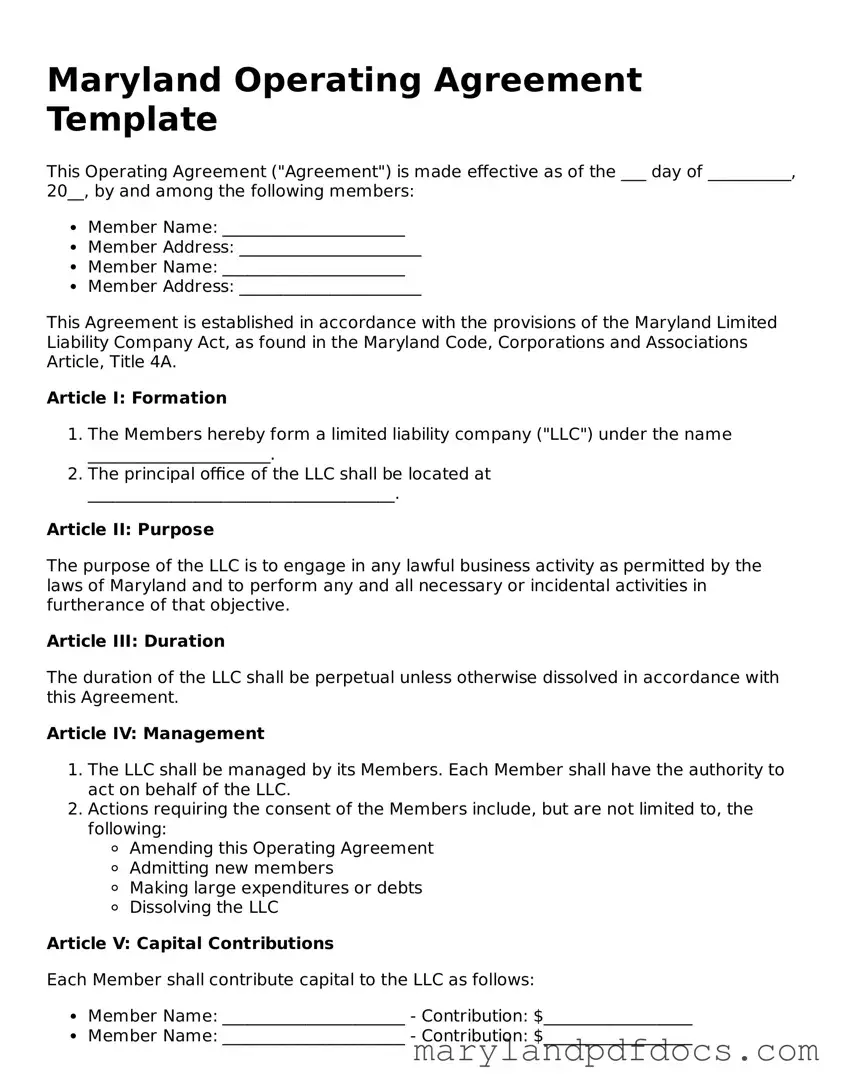What is a Maryland Operating Agreement?
A Maryland Operating Agreement is a legal document that outlines the management structure and operating procedures of a Limited Liability Company (LLC) in Maryland. It serves as an internal guideline for the members of the LLC, detailing how decisions are made, how profits and losses are distributed, and the roles of each member within the company.
Is an Operating Agreement required in Maryland?
While Maryland law does not mandate that LLCs have an Operating Agreement, it is highly recommended. Having one in place can help prevent disputes among members and provides clarity on how the business will operate. It also helps to establish the LLC as a separate legal entity, which is crucial for protecting personal assets.
Who should draft the Operating Agreement?
The Operating Agreement can be drafted by any member of the LLC, but it is often advisable to seek assistance from a legal professional. An attorney can ensure that the agreement complies with Maryland laws and addresses the specific needs of the LLC, making it more effective in preventing future conflicts.
What key provisions should be included in the Operating Agreement?
Several important provisions should be included in the Operating Agreement. These typically cover the management structure, voting rights, capital contributions, profit and loss distribution, procedures for adding or removing members, and dissolution processes. Tailoring these provisions to fit the unique needs of the LLC can enhance its functionality and stability.
Can the Operating Agreement be amended?
Yes, the Operating Agreement can be amended. It is important to include a procedure for amendments within the document itself. This ensures that all members are aware of how changes can be made, which can help maintain transparency and cooperation among members as the business evolves.
What happens if there is no Operating Agreement?
If an LLC does not have an Operating Agreement, Maryland's default LLC laws will govern the company. This may not align with the members' intentions or expectations, potentially leading to disputes and confusion. Without a clear agreement, decision-making processes and profit distribution may become contentious among members.
How does an Operating Agreement affect liability protection?
An Operating Agreement reinforces the limited liability status of an LLC. By clearly defining the roles and responsibilities of members, it helps to establish that the LLC is a separate entity. This separation is crucial for protecting members' personal assets from business liabilities, provided that the LLC is operated in accordance with the agreement and state laws.
Is it necessary to file the Operating Agreement with the state?
No, the Operating Agreement does not need to be filed with the state of Maryland. It is an internal document meant for the members of the LLC. However, keeping a copy on file is essential for reference and to resolve any potential disputes among members.
Can an Operating Agreement be used for other business structures?
While the term "Operating Agreement" is specific to LLCs, other business structures have similar documents. For example, corporations use bylaws, and partnerships often draft partnership agreements. Each of these documents serves a similar purpose: to outline the rules and procedures governing the business entity.

